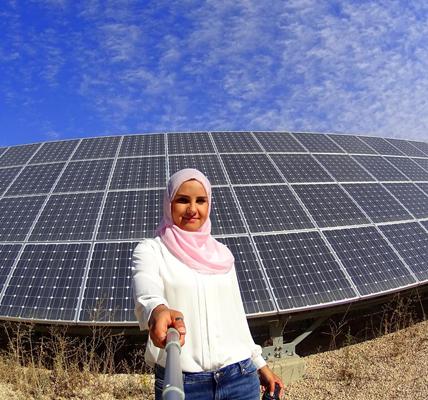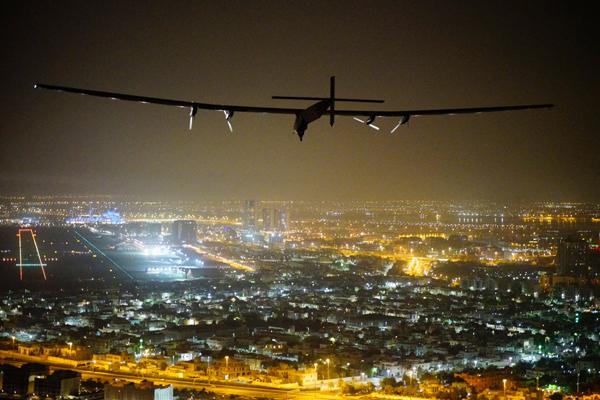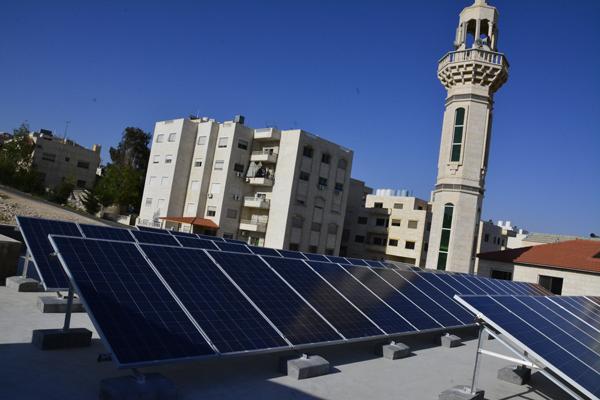You are here
Young Jordanian gains int’l recognition for efforts to promote green energy
By Omar Obeidat - Oct 11,2015 - Last updated at Oct 11,2015

Ayah Al Fawaris
AMMAN — Ayah Al Fawaris is a computer engineering graduate, but her passion for nature has turned her into an internationally recognised green energy professional.
In 2014, she was named the “Young Energy Professional of The Year”, an international award from the Association of Energy Engineers in Washington DC.
She was also a runner-up in Masdar’s Blogging Contest for Describing a Sustainable City in 2030, for which she chose her home city of Irbid, 80km north of Amman.
In the blog, which was featured on The Huffington Post, she envisioned how Jordan’s second-largest city could be transformed into an ideally efficient and sustainable place to live through the use of green energy as the main source of power.
Fawaris was also called recently to participate in a Global Superhero initiative as part of Project Everyone, a UN project to showcase young people working to achieve the Sustainable Development Goals, which come into effect on January 1, 2016, replacing the Millennium Development Goals set in 2000.
Finally, she is the founder of a blog called “Lady Solar”.
In an interview with The Jordan Times, the award-winning young conservationist gave credit to her family, which she says has a history of caring for nature, for the success she has achieved in the clean energy industry.
Family
Fawaris said her environmentalism and passion for renewable energy stem from interaction with nature at a young age.
“I grew up in a family that taught us to preserve resources, reduce our waste, and plant trees”.
“My father always recycles plastic and metal waste into useful products that we use either at home or at the farm, and my grandmother is the queen of grey water and fertilising,” she said.
“She is 85 now and still uses household wastewater to water the plants and organic waste to fertilise them,” the 27-year-old energy professional continued.
Family support, combined with participation in several international conferences on green energy and climate change, encouraged her to think globally and act locally, Fawaris said.
At the One Young World Summit in Zurich in 2011, Fawaris and other activists from various countries decided to launch an international project named “Wake Up Call”, in which each of them urged a government entity or a decision maker in their home country to make one change to improve national life.
“By that time, Jordan was sinking in debt because of its energy bill and climate change was becoming a hot topic in the international media. I did some research and found out that while Jordan is located within the solar belt and has one of the highest solar irradiances in the world, the government hadn’t taken serious steps to develop renewable energy. My choice [to receive the wake-up call] was Jordan’s minister of energy,” she said.
Clean energy as a profession
In 2011, after her graduation from university, Fawaris said she was offered an appealing job opportunity at a company in Abu Dhabi.
The previous year, she had completed an internship with an IT company in that city, during which she worked on computerising all of the procedures of the Abu Dhabi Food Control Authority.
However, Jordan passed the Renewable Energy Law at the same time, and Fawaris felt that she “couldn’t decline” another offer to work for a solar energy company in Amman.
“I chose to follow my passion and it turned out to be the right thing to do, especially since I don’t see myself sitting behind a computer all day. I figured out that it’s not who I am or who I want to be. It was too late to change my major, but I didn’t allow this to limit my ambition. And I was very lucky to find a company that believed in me without my having a certificate in that field.”
She has since worked on several clean energy projects, such as the first solar-powered mosque in Jordan and the first solar-powered church in the Middle East, both located in Amman.
She has also participated in several energy projects in other countries in the region.
A message to decision makers
Fawaris urged the government to develop an incentive programme for underprivileged households to help them install solar energy systems, instead of subsidising their bills for electricity generated from fossil fuels.
She also expressed her optimism regarding the outlook for green energy in the Kingdom.
“The renewable energy future in Jordan is very promising. Our government has realised the importance of renewable energy and its addition to our energy mix. International investors find Jordan very attractive due to its geographical location, the private sector is very competitive with a great number of opportunities, and finally regular electricity users find renewable energy economically feasible.”
Related Articles
ABU DHABI, United Arab Emirates — The United Arab Emirates might not seem like an obvious spot to begin and end a globe-spanning flight prom
AMMAN –– Around 400 mosques in the Kingdom are currently generating power from solar energy, Awqaf Ministry Secretary General Abdul Munem Hi
AMMAN — Prime Minister Bisher Khasawneh on Saturday attended the launch of the Baynouna solar and photovoltaic energy station, located near



















